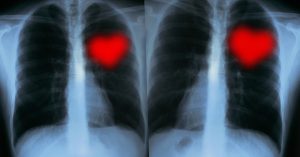5 Lesser Known Heart Conditions
Heart disease is the leading cause of death for both men and women in the United States, accounting for approximately one in every four deaths — or 610,000 deaths — every year. Although coronary heart disease (CHD) is the most common type of cardiovascular ailment, it’s only one of several heart conditions that can have an adverse effect on a person’s health.
Considering the fact that about 735,000 Americans suffer from a heart attack each year, it’s important to keep a close eye on your heart health. Heart disease isn’t necessarily a rarity, and a person can become a part of these shocking statistics quite easily if they have high blood pressure, high cholesterol, or diabetes. Furthermore, people who smoke, are overweight or obese, have a poor diet, are physically inactive, or consume alcohol excessively have a higher risk of heart disease according to the Centers for Disease Control and Prevention (CDC).
If you suffer from any of these conditions or take part in activities that have been linked to heart disease, consult the best cardiologist in Tampa, Dr. Sachin V. Diwadkar, FACC, FASE, of Ascent Cardiology. In addition to CHD, heart disease can manifest in a variety of lesser known conditions, including heart failure, aortic aneurysms, arrhythmia, valvular heart disease, and heart infections.
Considering the fact that about 735,000 Americans suffer from a heart attack each year, it’s important to keep a close eye on your heart health. Heart disease isn’t necessarily a rarity, and a person can become a part of these shocking statistics quite easily if they have high blood pressure, high cholesterol, or diabetes. Furthermore, people who smoke, are overweight or obese, have a poor diet, are physically inactive, or consume alcohol excessively have a higher risk of heart disease according to the Centers for Disease Control and Prevention (CDC).
If you suffer from any of these conditions or take part in activities that have been linked to heart disease, consult the best cardiologist in Tampa, Dr. Sachin V. Diwadkar, FACC, FASE, of Ascent Cardiology. In addition to CHD, heart disease can manifest in a variety of lesser known conditions, including heart failure, aortic aneurysms, arrhythmia, valvular heart disease, and heart infections.
1. Heart Failure
Your heart is one of the hardest working muscles in your body. From the moment you’re born, your heart never stops beating. This is a remarkable feat that relies on healthy decision-making and careful monitoring to sustain. When your heart muscle starts to weaken or becomes stiff, it can lead to significant problems as a result. When your heart loses its ability to pump blood efficiently it can lead to congestive heart failure (CHF). Heart failure doesn’t necessarily denote that your heart is going to stop working, but it does imply that your heart isn’t functioning at its peak. This can lead to shortness of breath, swelling, and other symptoms.
2. Aortic Aneurysms
An enlarged or bulging aorta is a common result of perennial high blood pressure or high cholesterol. When this happens, it makes it difficult for this important blood vessel to transport blood throughout the body, resulting in an aortic aneurysm. This is a serious condition that may require immediate medical care.
3. Arrhythmia
Atypical heart beats — either too fast, too slow, or altogether irregular — can cause an array of cardiovascular problems. There are many types of arrhythmia including atrial fibrillation (irregular or rapid heartbeat), paroxysmal supraventricular tachycardia (accelerated heartbeat), or premature ventricular contractions (skipped heartbeats).
4. Valvular Heart Disease
Your heart contains four different valves. Each one of these valves can develop issues, even in people who take great care of their cardiovascular health. You can be born with heart valve problems, or they can be damaged by various types of infections. Some common types of valvular heart disease include:
• Aortic valve regurgitation
• Aortic valve stenosis
• Endocarditis
• Mitral valve regurgitation
• Mitral valve stenosis
• Mitral valve prolapse
• Aortic valve regurgitation
• Aortic valve stenosis
• Endocarditis
• Mitral valve regurgitation
• Mitral valve stenosis
• Mitral valve prolapse
5. Heart Infections
While many of the conditions listed above are distinctly related to the various parts of the heart, some infections can develop independently and then attack the heart. Tuberculosis and a handful of other viruses can cause pericarditis. Others will attack the heart muscle leading to myocarditis. In some rare circumstances, bacterial infections can also infect the heart valves, which causes endocarditis.
These lesser known conditions can lead to adverse effects on your health that limit your ability to enjoy life to the fullest. Don’t let your heart health stop you from doing what you love. Identifying your ailment in the first step to recovery.
To consult the best cardiologist in the Tampa Bay area, from Ascent Cardiology, please request an appointment today.
Disclaimer: The contents of this website are for general educational purposes only. All content and media on the Ascent Cardiology Group website does not constitute professional medical advice nor is the information intended to replace the services of Ascent Cardiology Group or other qualified medical professionals. If you believe you are having a medical emergency, call 911 immediately.
The content, views, and opinions communicated on this website do not represent the views of Ascent Cardiology Group. Reliance on any information provided by this website is solely at your own risk. Although this website contains links to other medical websites, this is strictly for informational purposes. Ascent Cardiology Group is not responsible nor do they approve of the content featured on any third party linked websites referenced on this website.
The content, views, and opinions communicated on this website do not represent the views of Ascent Cardiology Group. Reliance on any information provided by this website is solely at your own risk. Although this website contains links to other medical websites, this is strictly for informational purposes. Ascent Cardiology Group is not responsible nor do they approve of the content featured on any third party linked websites referenced on this website.
More Resources

Stress and Heart Disease: What You Can Do to Improve Your Heart Health
Working long hours, filling up free time, and taking on additional responsibilities is a way of life for Type A

What is Nuclear Cardiology?
Nuclear cardiology is a subspeciality of general cardiology that involves the use of radioactive substances and advanced medical imaging modalities

Coronary Heart Disease: What Is It and How Is It Treated?
In addition to being the most common type of heart disease, coronary heart disease is the deadliest. In fact, it’s